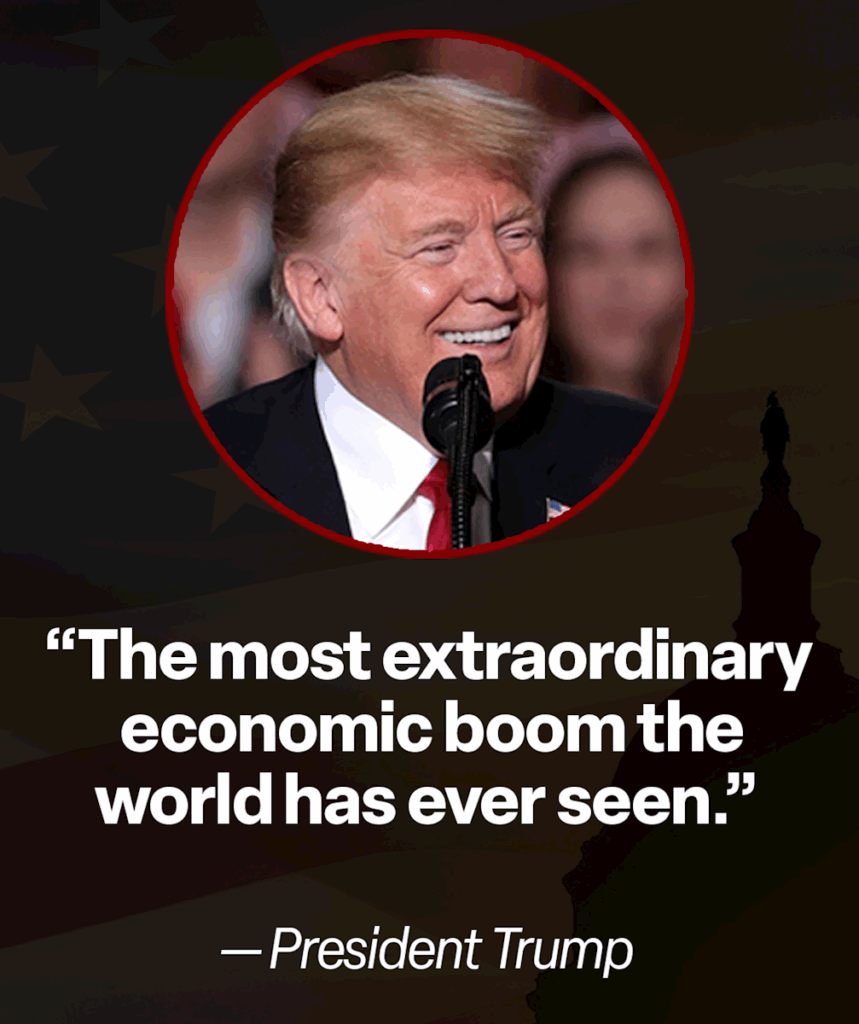Issue #116, Volume #2


Following Buffett’s Lead On Stocks To Buy And Hold Forever
This is Porter’s Daily Journal, a free e-letter from Porter & Co. that provides unfiltered insights on markets, the economy, and life to help readers become better investors. It includes weekday editions and two weekend editions… and is free to all subscribers.
Editor’s note: Partner Pass members will be receiving three recommendations in their inboxes tomorrow, Thursday, October 9. Porter is providing a surprising new recommendation in The Big Secret On Wall Street – an unusual second recommendation for the month. Erez Kalir is also releasing a Tech Frontiers recommendation tomorrow – pushed back from the normal first Thursday of the month. And Marty Fridson’s Distressed Investing is publishing its regularly scheduled bond recommendation tomorrow as well.
| Putin’s brutal attacks… All oil is his oil… No one messes with this Japanese firm… Following its 17 Rules for 300 years… Buffett’s going in big on these companies… Gold continues to run hot… A new twist on the jobs market… |
In the early 2000s, Russian President Vladimir Putin began seizing control of the Russian economy.
Putin’s actions were unmistakably brutal… At least 20 high-profile deaths or imprisonments were linked to his efforts to control all of Russia’s energy complex.
And financially vicious… Putin gobbled up any international oil companies that got involved and “sold” them to state-run firms.
And he did this all for wealth and power. Putin knew that Western powers were weak – he knew NATO wouldn’t engage in things like espionage, blackmail, or murder to protect their interest in the ways that Putin had in gaining them.
He knew he could seize their assets easily.
There are exceptions… There was one institution not even Putin was willing to cross.
As an example, in 2009, a massive oil, gas, and liquefied natural gas project had taken in huge amounts of foreign capital, almost $100 billion. But long before the oil started flowing, Putin decided to kick the foreign investors out and keep the resource for himself.
But one Japanese company was an early investor in the deal. All the international firms were kicked off the deal or had their stakes greatly diminished, including energy giant BP.
This Japanese company retained its full stake.
It is an ancient Japanese family-run business – which owns virtually nothing openly or directly. It wins without a battle by focusing on long-term advantages rather than short-term clashes.
Asia is controlled by only a few dozen families. And the most powerful families are hidden from the public. They do not operate directly, or in the open, but instead through an enormous web of holding companies. They control banks, insurance companies, and have privileged access to government capital. Rather than seeking formal control, they sell majority stakes to prominent operators, while always secretly holding the reins of power.
They are masters at discretion. They are masters at being able to accurately value each portion of a corporation’s capital holdings. And most of all, they are the uncontested masters of long-term strategy. They do not measure results quarterly. They measure results by the century.
And, by doing so, they maximize their return on invested capital in ways no other business in the world can. Over hundreds of years, they’ve learned that real real power is having the ability to destroy everyone… but, unlike Vladimir Putin, choosing not to do it. And Putin didn’t mess with them.
There are perhaps five companies in Japan that have such influence.
And there’s one that rises above all of these ancient houses. It maintains a 400-year-old tradition as the most powerful of all the leading Japanese companies. It is the master of Japan’s financial markets, trading houses, and industries across Asia… And I write in depth about these companies in general and this one in particular in tomorrow’s The Big Secret On Wall Street.
Putin knew this company was immortal. And unbreakable. Stealing from this company would have been suicide, for Putin and for Russia.
This company isn’t a normal holding company. It is part of Japan’s strategic plan to acquire and retain critical energy, metals, and food. That’s why it is granted capital at the world’s lowest rates.
Its investing style is a lot like Warren Buffett’s, except instead of the insurance companies putting up the free capital, in Japan it’s the banks and the government.
And rather than winning by using force, this company’s core cultural strategy is based on a pragmatic willingness to compromise and adapt when direct confrontation would lead to certain defeat.
It still lives by the family’s “house rules,” a set of 17 principles that have guided the enterprise for over three centuries. These rules emphasize ruthless pragmatism: avoid unnecessary risks, prioritize long-term stability over short-term gains, and maintain family unity through strict governance. And if there is any doubt to the company’s sustainability, look at Rule 17: These rules are eternal and must be passed down unchanged to future generations.
The company’s historical pragmatism finds a modern echo in Warren Buffett. Over his career, Buffett transformed a struggling New England textile mill (Berkshire Hathaway) into an almost $1 trillion endeavor that mirrors the structure and strategy of Japan’s biggest conglomerates.
Thus, it was hardly a surprise when Buffett first announced his investments in the Japanese trading firms on August 31, 2020… By October 2025, these positions had appreciated roughly 117% to $30 billion, making them Buffett’s largest ever investments outside of Apple (AAPL) and American Express (AXP).
As I write in tomorrow’s Big Secret On Wall Street…
“I believe this is Buffett’s greatest ever investment. And, I suspect, the real value of Buffett’s Last Trade won’t be fully appreciated for another 20 or 30 years.”
This is not mere speculation. It is the timeless mechanism by which the intellectual elite of business preserve and multiply wealth, a strategy Buffett has championed throughout his career.
I wrote about it last week in the Daily Journal – discussing one of Buffett’s earliest investments, in the Philadelphia & Reading Company. Buffett and his mentor Benjamin Graham unlocked value in a dying coal company to boost the share price from $10 to $200 – a 2,000% return, way outpacing the Dow Jones Industrial Average over six years in the 1950s.
The lesson: True wealth accrues not from speculation but from owning undervalued claims on productive assets, patiently unlocking their potential.
Horse, meet water.
If you buy the stock that I recommend in tomorrow’s Big Secret On Wall Street, never, ever sell it.
And if you are not a paid-up subscriber and you want access to the amazing story that we publish in tomorrow’s Big Secret, click here now to join. You will not regret it.
White House Insider Buck Sexton:
“Trump’s Next Move Will Shock The World”
It could single-handedly reshape the global order… dramatically increase U.S. power… and trigger a massive American market boom the likes of which we haven’t seen in 75 years.
Three Things To Know Before We Go…
1. Why the job market is tightening. A combination of fewer government jobs, lower immigration, and rapid artificial intelligence (“AI”) adoption is reshaping the labor market, creating the appearance of softness despite a growing economy. Inflation remains well above the Fed’s 2% target – in fact, the Atlanta Fed’s GDPNow projects 3.8% growth in Q3, showing the economy is still running hot. AI-related investment added 1.1 percentage points to GDP growth in the first half of the year, signaling the start of a broader capex cycle. But if consumer spending weakens and corporate investment slows, it could be the canary in the coal mine for the next downturn – especially with the labor market already tight.
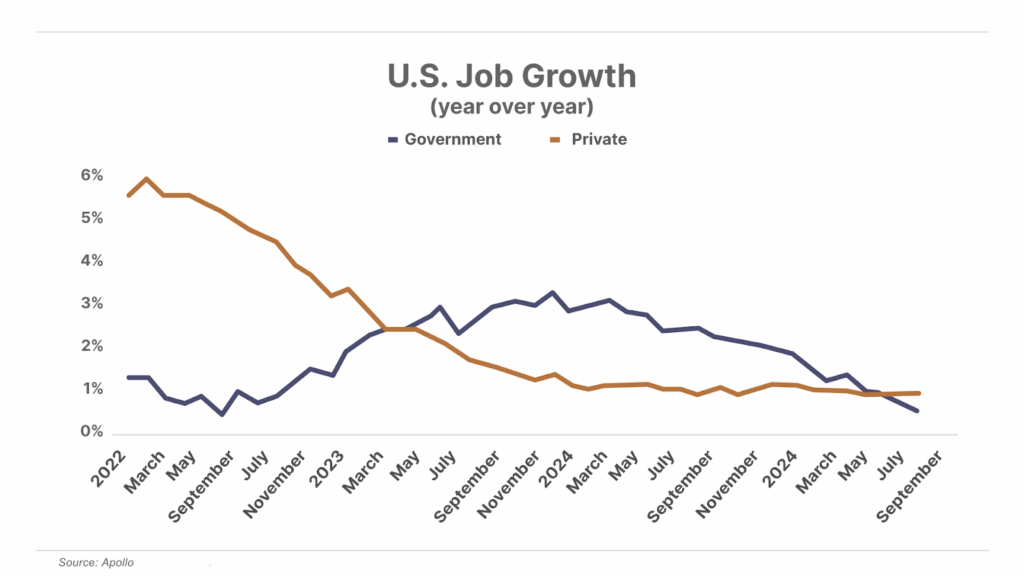
2. Auto loans go bust. The price for bonds backed by auto loans collapsed in September, posting their worst monthly decline since the COVID-19 outbreak in March 2020. Two high-profile bankruptcies – subprime auto lender Tricolor and auto parts supplier First Brands – sparked the collapse in auto-loan prices. With a record $1.6 trillion in total auto loans outstanding, the ripple effects from the stress in this sector could spread into the broader credit markets.
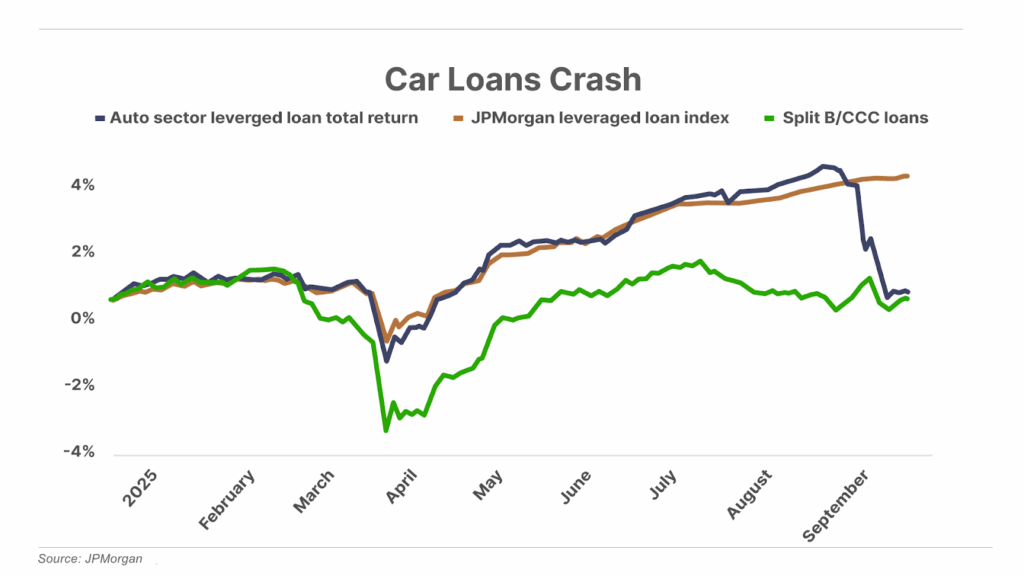
3. Gold passes another major milestone. The precious metal continued its historic rally, trading above $4,000 per ounce for the first time today. Yet despite all the attention gold is receiving in the financial media, data suggests it is still not a “crowded” trade. According to the latest weekly survey from the American Association of Individual Investors (“AAII”), more than half of respondents (55.6%) still don’t have any exposure to gold or other precious metals – either directly or through exchange-traded funds (“ETFs”) – in their portfolios at all.
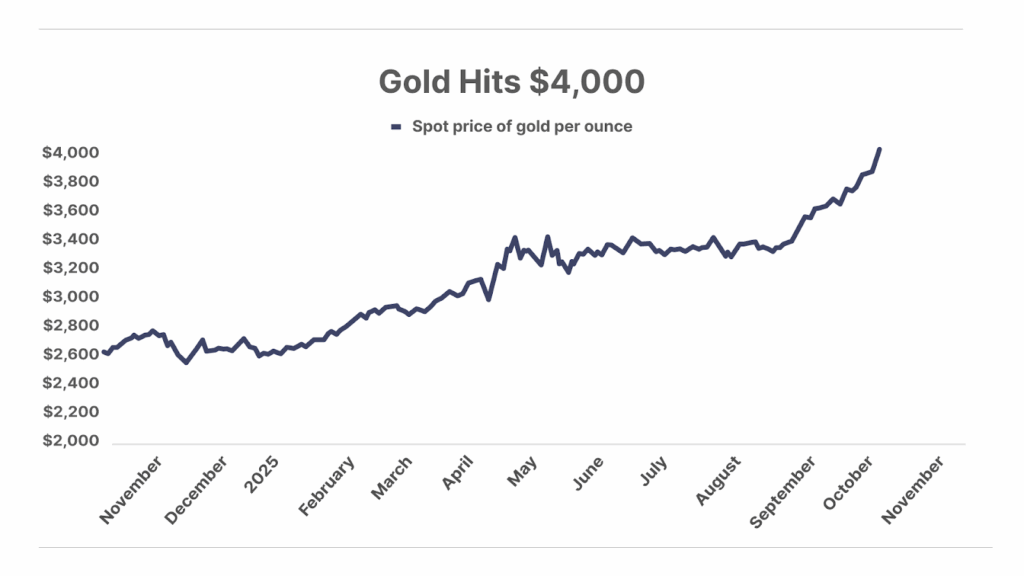
And One More Thing… A Poll On Gold
Mailbag
On Monday, the Daily Journal’s main essay was titled “Why Gold Keeps Going Up,” and generated input from readers.
What a great article explaining gold and its history.
Thanks, Ben M.”
Enjoyed your article on why gold keeps going up. Thought you might have included Bitcoin’s stock-to-flow ratio as it is truly a “hard calculation.”
I very much appreciate being a valued member of Porter & Co.
Best wishes,
Stephen G.”
Tell me what you think: [email protected]
Good investing,
Porter Stansberry
Stevenson, Maryland
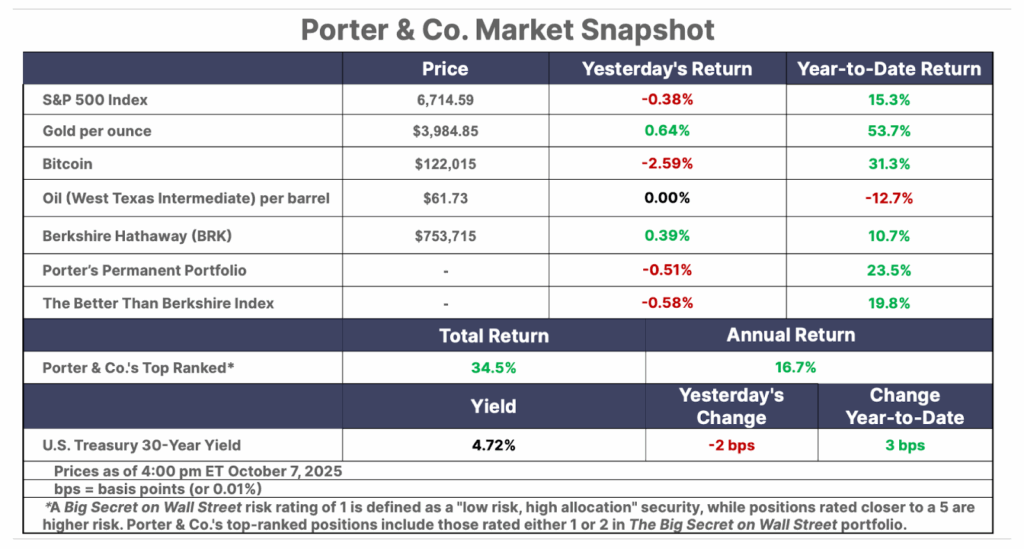
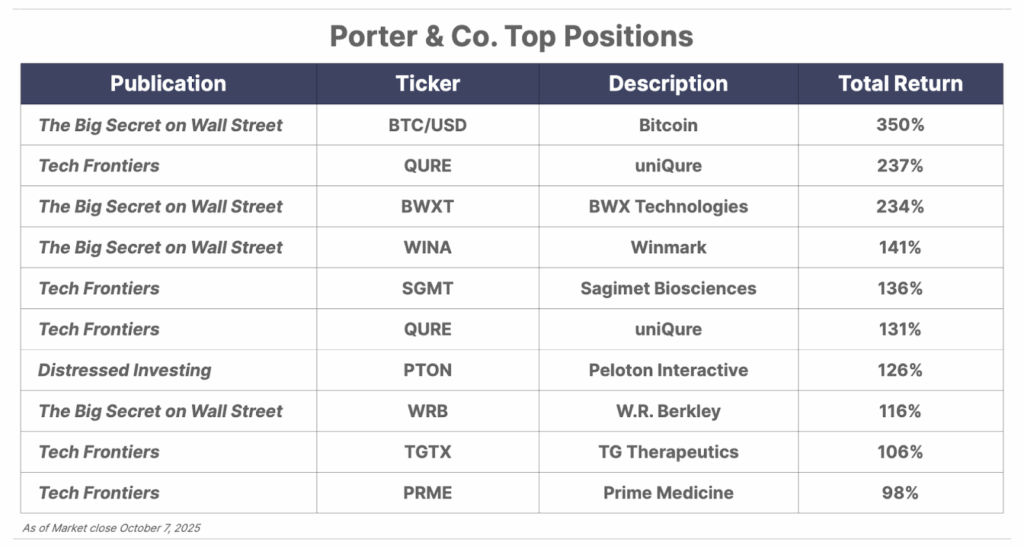
Please note: The investments in our “Porter & Co. Top Positions” should not be considered current recommendations. These positions are the best performers across our publications – and the securities listed may (or may not) be above the current buy-up-to price. To learn more, visit the current portfolio page of the relevant service, here. To gain access or to learn more about our current portfolios, call our Customer Care team at 888-610-8895 or internationally at +1 443-815-4447.
